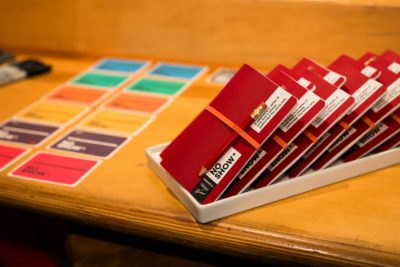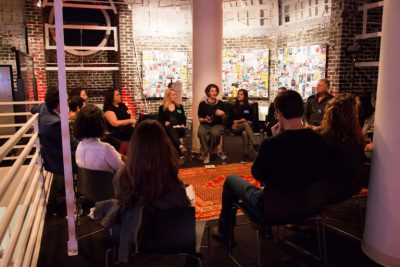Conversation & Connection: How to Show up for No Show

Photo credit: DIALOGUE and Gershoni Creative
A dangerous trend abounds where many people refuse to engage with one another in civil discourse and critical debate. We’ve lost grip on emotional intelligence and given up talking about what’s important in our lives in a productive way. Many instead choose a position they’re set on winning versus listening to opposing views and contemplating a change of heart and mind. This builds a wall between us when in fact many of us have more in common than we think. We simply need to drop the fear and be willing to connect with one another. This is where No Show comes in.
No Show is a collaboration between DIALOGUE, a pop-up think tank that empowers companies to be more relevant, and Gershoni Creative, a well-regarded branding agency. No Show is a series of intimate discussions where 12-15 people are selected based on their backgrounds, perspectives and occupations to discuss a particular topic reflective of the human condition. I was invited to a discussion on ritual.
Produced quarterly, No Show is held atop the historic Humbolt Bank Building in Gershoni’s office. Nestled in the refurbished dome filled with ethnic rugs, exposed brick, keyhole windows, and an antique carousel horse, it felt like an artsy, safe aerie above the busy city. It was in this creative nest that guests gathered. We needed no preparation—simply to arrive open and ready to participate in discussion.
I can see how people arrive at No Show thinking it will be a great opportunity to network, job hunt or spark a partnership. I did. But there are rules at No Show. The most important is that no one mention their occupation until the end of the evening. Networking is not why No Show exists, though it’s an unintended consequence given the natural chemistry among the group the setting creates.
Conversation was facilitated by Rimma Boshernitsan, founder of DIALOGUE, and Amy and Gil Gershoni, founders of Gershoni Creative. They formatted the evening purposely to ignite our thinking about what ritual is and means to us. For example, Amy posed the question, “Is ritual something we engage in deliberately, or have we passively inherited it from our ancestors?”
The program was structured into three parts: first we were paired with one person, then split into two small groups, and finally melded into one big group. By the end of the night, Rimma invited us to share our backgrounds. I forgot we hadn’t done that yet because I was engrossed in the conversation and connecting in a way different from how I do every day.
We introduced ourselves as artists, technologist, designers, curators, architects, communicators, business strategists and community builders. No Show is deliberate—a place to explore facets of our lives with others unlike us. We got to know each other in a way that would seem unnatural outside that environment, yet it was so natural. In a time when we need to relate to each other more than ever, we can in fact connect one-on-one in more meaningful ways when we leave occupation out of the equation.

Photo credit: DIALOGUE and Gershoni Creative
There were people at No Show I would never cross paths with in my daily life. We had chemistry, respect and courtesy. We were interested and open, and didn’t push our beliefs, but explored an idea together. One question led to another: What is ritual? Is it tradition, culture, religion? Is it something we do everyday without question? We discussed the de rigueur of holiday family gatherings and whether ritual is forced or chosen. Ultimately, we realized that ritual means different things to different people.
Aside from the juicy conversation about ritual, I re-discovered something about myself—I still like to philosophize in ways I did in college so many years ago. More than that, I learned a new way to connect with strangers. How often do any of us sit and contemplate with those we don’t know? When are we gathered with people from different backgrounds to discuss a topic we engage in daily but think of rarely? We’re distracted by busy schedules and technology that we forget to explore the many facets of humanity. That’s not to say those things don’t have their place, but to what end if we’re not considering how we as individuals fit into the bigger picture and with each other? No Show founders know this, which is why they carefully curate the evening to create an ideal environment for uncovering new thought.
At the end of the night, I left with a similar feeling I had when I went skydiving for the first time—that I wanted to have the experience again, immediately. I didn’t want to leave another amazing opportunity to connect around significant topics to chance.
My question is: How can we bring this deep listening and connection into our everyday lives? I’d love to hear from you. What ideas do you have to foster healthy, thoughtful dialogue?